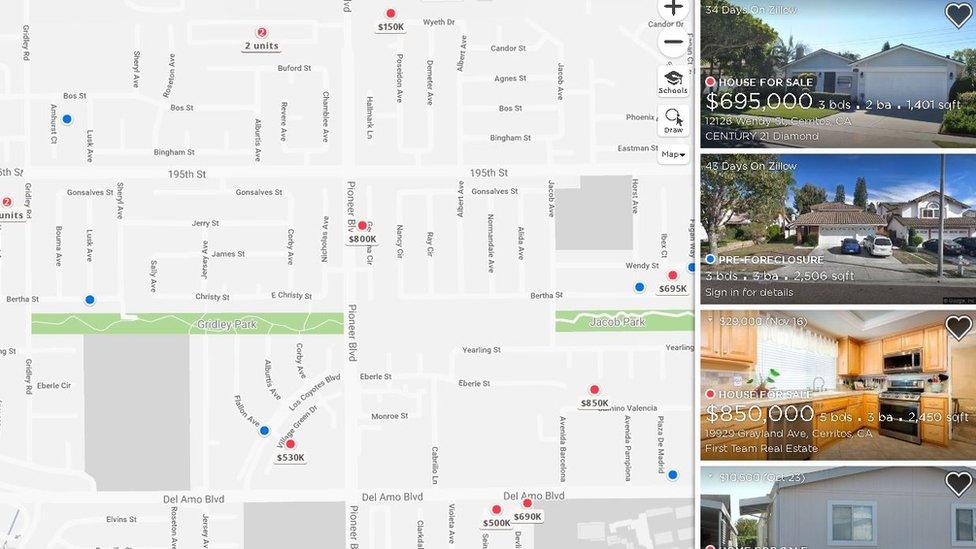'The Rolling Stones inspired me to go into business'
- Published

Spencer Rascoff has been chief executive of Zillow since 2010
The BBC's weekly The Boss series profiles different business leaders from around the world. This week we speak to Spencer Rascoff, chief executive of US property website Zillow.
Going to a Rolling Stones concert has inspired generations of teenagers to pick up a guitar, but for Spencer Rascoff it was instead the catalyst for a life in business.
As a teen, Spencer was lucky enough to go backstage at a number of the band's gigs in the early 1990s.
But rather than marvelling at Mick Jagger, Keith Richards and the rest of the group, he says he was fixated on the teeming personnel running around to keep the entire show on the road.
"I saw the tour producer as the chief executive, and the band and the show was the product," says Spencer, now 43.
"That was a formative experience for me, I was fascinated by the business of music."
Spencer was able to go backstage at the concerts because his dad Joseph was a business manager and tour producer for the Stones, and a host of other top acts including U2, David Bowie and Paul Simon.
Yet while the experience made Spencer want to run a business, his dad advised him against going into the vagaries of the music industry.

It was watching the Rolling Stones that inspired Spencer Rascoff to one day run a business
Today Spencer is the chief executive of US property listings website Zillow, which is worth about $3.9bn (£3bn).
The Seattle-based company has an annual turnover of more than $1bn, and says it is used by 195 million Americans every month, external who are looking to sell, buy or rent a home.
Raised in New York and Los Angeles, Spencer went to Harvard University, where he graduated with a degree in government and economics.
After two years working as an investment banker on Wall Street, aged 24 he co-founded his first business, travel website Hotwire.com, in 1999.
The company grew quickly, but was then badly affected by the terrorist attacks of 11 September 2001.
Not only was Hotwire hit by the subsequent downturn in travel, it faced a public relations storm when the FBI discovered that some of the hijackers had used it to buy tickets.
The tickets in question were not for the planes on the fateful day, but for flights a few days earlier, yet Hotwire faced difficult headlines.
"That kind of press, and the fact that people weren't flying much after 9/11 forced Hotwire to tighten the belt significantly, and that was tough to do," says Spencer, who was the company's vice president and who also lost a family friend in the terrorist attacks.
As a result, Hotwire found itself in difficulty and had to lay off staff.

The 9/11 terror attacks, commemorated every year with a "Tribute in Light", affected Spencer both personally and professionally
Spencer and his co-founders then saw much of their equity wiped out when the company was forced to lower the value of the business to attract vital new investment.
The ultimate consequence of this was that when Hotwire was sold to rival Expedia for $663m in 2003 Spencer's proceeds from the sale "were minimal".
After working for Expedia for a year, he left to join two former Expedia employees who had just launched a property website called Zillow.
The aim was to list properties for sale across the US, but as Spencer admits, they weren't exactly sure how they were going to monetise it.
"When we began we had no business model," he says. "We just wanted to build a huge audience and then figure out the model later."

More The Boss features:

To build up this audience Zillow allows anyone selling a home to list it for free on its website, be they members of the public, or a firm of estate agents. The website (and the app that followed) is also free for people to use when hunting for a home to buy or rent.
So how exactly does Zillow make its money? Through advertising.

Zillow claims to list 110 million US homes
Firstly, estate agents can pay for their properties to appear at the top of the search list in any given region. And secondly, other businesses in the wider housing sector can pay to place adverts, such as interior designers, or home improvement retailers.
These retailers are attracted by Zillow's vast user numbers. To help secure these eyes on screen the company aims to list every single property in the US, not just those up for sale or rent. It does this by trawling through public records, such as lists of residential property tax values, and using photos from Google Street View.
Currently Zillow claims to list the details of 110 million homes in the US (which includes homes for sale, for rent and those not currently on the market), out of the total 137.4 million that the US Census Bureau says are in the country., external
For each listed home, Zillow gives an estimated value or "zestimate".
Saul Klein, editor of online news outlet Realty Times, says that Zillow's property values can sometimes cause problems.
"Many people use these as an authoritative source, forgetting it's just an estimate," says Mr Klein. "And real estate agents get very frustrated with these figures because home owners would argue with them, saying this or that estimate is what the home is worth."
Mr Klein adds that Zillow is operating in a very competitive marketplace. "There are a lot of players out there, so how Zillow will stake up in five or 10 years from now is a question mark."

Spencer regularly travels between Zillow offices
Now expanding the business into Canada, Spencer has been chief executive since 2010. Since then the business has acquired 15 smaller rivals, and in 2011 floated on the New York Stock Exchange.
The firm's most recent financial results showed that its turnover in the three months to the end of September was 22% higher than the same period a year earlier., external This growth was, however, below market expectations and the company's shares have lost half their value since the summer, external on signs that the US housing market is slowing.
While Spencer may not have followed his late father (Joseph Rascoff died last year) into looking after concert tours, he is often on the road.
"We have nearly 4,000 employees spread out in a dozen offices, and I travel frequently because I feel that it's important to spend time directly with employees," he says.
"A typical day on the road is 6am until 11pm, with email and social media squeezed in at the end of a long day."